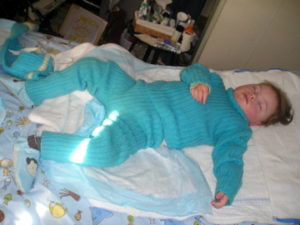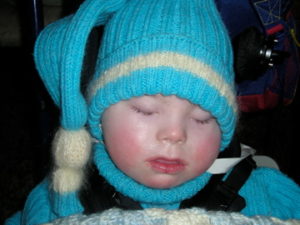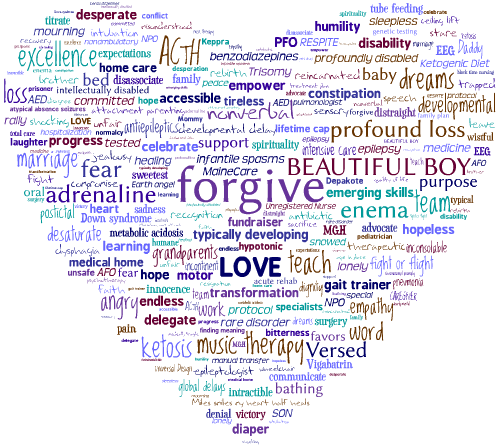Miles Smiles (My Heart Half Heals)
Mothering a severely disabled child with love
A perpetual gift
After my firstborn child had received two devastating diagnoses, I started trying to get back out into the world to do “normal” things. This wasn’t easy, both because of the necessary logistics, and especially because of my ravaged emotional state. I forced myself to do it anyway. It was part of saving myself.
I scheduled my usual types of appointments over the phone, from medical to self-care, knowing that little Miles would often have to come with me. I had limited nurses and no family nearby to watch him, and I could not leave him with just any babysitter. Anyone who took care of him had to have at least some medical training.
On the morning of my hair appointment, when Miles was almost three years old, I got each of us ready. His morning ritual was lengthy, and involved medications and enteral formula, all given via G-tube. This was after changing, bathing, and dressing him. He could not assist with any of it.
It was a half-hour drive to the salon on that wintry New England day. I parked our adaptive van in the dedicated HP parking spot, got out, and deployed the cold metal side ramp manually, being careful not to pinch my fingers as I unfolded it. I took my Kewpie-doll-faced boy gently out of his car seat and covered him with kisses as I put him into his adaptive stroller. He made a few little vocalizations in return, which made me happy. But I could see the subtle seizures starting in his face and upper body again. My heart felt its usual weight as I tried to stay present with my seizing son.
As I pushed Miles up the walkway to the building, an energetic woman with pixie-ish hair held the door open for us. I thanked her and pushed my sweetheart through the doorway.
Inside the funky space, we were warmly welcomed as usual, and I was introduced to Beverly, the woman who had let us in.
“I’m a pediatric RN,” she told me, with a warm smile and a knowing look. She could not have made a more reverent new acquaintance. Numerous Registered Nurses had cared for my medically fragile toddler, both at home and in the hospital, since he was an infant. They had even helped save his life.
Bev had good energy. Her hands were capable and expressive, bedecked with chunky jewelry. She had just gotten her hair cut by our mutual hairdresser.
“Any chance you’re looking for some private-duty hours?” I asked her sweetly, pretending to be casual and knowing she would say no. Miles had been approved for substantial RN-level nursing support from the state, but there was a perpetual shortage of home care nurses. I was shorthanded and tired, and I needed help.
Graciously, Bev thanked me but said she was too busy with her current shifts at the local hospital. I knew all too well that she had an ideal schedule and better pay working there.
I had taken Miles out of his stroller and his winter things to hold him, as she and I chatted a bit. In my lap, I quickly realized that he had pooped in his diaper. Here we were, away from home without proper amenities to take care of the mess in a dignified manner. There was no baby-changing station or table, and Miles was bigger than a baby now, anyway. The only place that I could think of for changing Miles was on the salon couch, in plain sight. I wanted to disappear, but knew that I had to do the right thing for my child whenever humanly possible, even if it was difficult.
When I whispered my suspicions to Bev, she was all reassurances. She said not to worry about the other folks in the room. Then, she mobilized as if she were on-duty.
Methodically, she did the things that I could not do alone while holding a messy Miles. She unpacked all the necessary supplies from his diaper bag, and spread out the disposable pad on the sofa for him.
I laid Miles down, and we worked together as a team to quickly undress and clean up my incontinent and soiled little boy.
Bev encouraged me with her voice and her words and her body language while I felt so self-conscious about what we had to do. She joked a bit and kept it positive. She refused to let me feel shame.
About fifty used baby wipes later, Miles was in a fresh diaper and clean pants, and the mess was gone. I sat on that merciful couch afterward, and held him close. He snuggled into me. Bev sat next to us, offering him her finger. She engaged Miles fully—another beautiful gift—although he could not respond. He was having more of the small clusters of seizures that nobody could stop or control. He could barely even look at us with his beautiful blue eyes.
“You are doing a marvelous job taking care of your son,” she told me.
I could scarcely believe my ears, and did a double take.
Finally, the foreign statement registered. She was referring to Miles’ neatly trimmed fingernails and toenails, the cleanliness of his rosy face, his infection-free G-tube stoma and pressure points. She was referring to his involved treatment plan, which included a strict dietary therapy for his intractable seizures. She was referring to the adaptive van and stroller and other gear. But Bev, in all her experience and wisdom, was also seeing and referring to much more than that.
As tears spilled over my cheeks, I smiled in thankful disbelief to receive such praise. Never had I been acknowledged in that way about my role as Miles’ primary caregiver, and rarely since.
“You are doing a marvelous job…” echoed throughout the hollow chambers of my achy heart, filling them with the understanding and support that I so deeply craved. Whew—a marvelous job. I had to take a deep breath as if I were publicly receiving a trophy, my knees buckling behind a podium. This was such high praise coming from Bev. She managed to make me glow while I broke down at this bit of recognition. It was worlds away from when I won my Senior Class Award in high school, or my Boston Music Awards nomination. But it meant just as much.
My achievements as a parent-caregiver were very different now: harder-fought, and largely overlooked. It was the most difficult work I’d ever done, and yet most of the people that I know hadn’t seen my caregiving as a real job, or as my biggest personal accomplishment. But Bev worked long, hard shifts in this world, and she got it.
I finally remembered to thank her with words, and sat up taller. My gratitude was tinged with true sadness when she said goodbye to me, and to Miles, that afternoon.
In the years that have followed, Bev’s words continue to resonate. They have also given me pause. I have realized that we often overlook the battles of the warriors that we know. Indeed, we even forget that they are true warriors, judging by what life is asking of them.
Do we somehow believe that a warrior’s heart is already overflowing with confidence, and needs no more?
Do we somehow believe that a warrior’s wounds would not be the slightest bit healed by the salve of encouragement?
Do we not hunger for that type of praise ourselves during difficult times, even if we already know in our hearts that we are doing a good job?
Bev’s ten words of praise were one of the most meaningful gifts I’ve ever received. They did not replace my own sense of worth, but they did make me swell with pride and helped me to feel understood. They gave me strength and energy to keep going.
I carefully filed those words away that day. I carry them with me still, and refer to them often, especially on the hard days.
And nowadays, I try to notice and remember those that are fighting and hurting. I try to find my fellow warriors, some of whom are battling very silently, and to encourage them the same way that I was encouraged. I want them to know the perpetual gift of acknowledgment, too.




